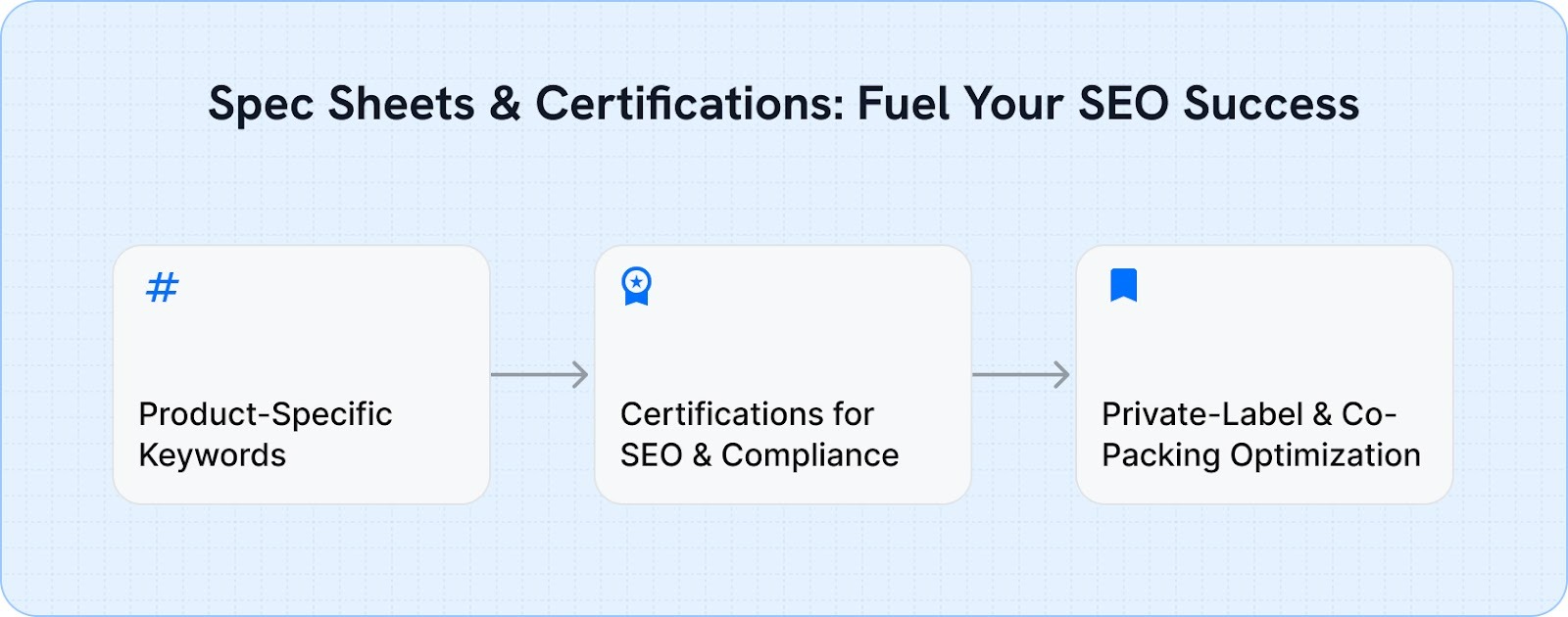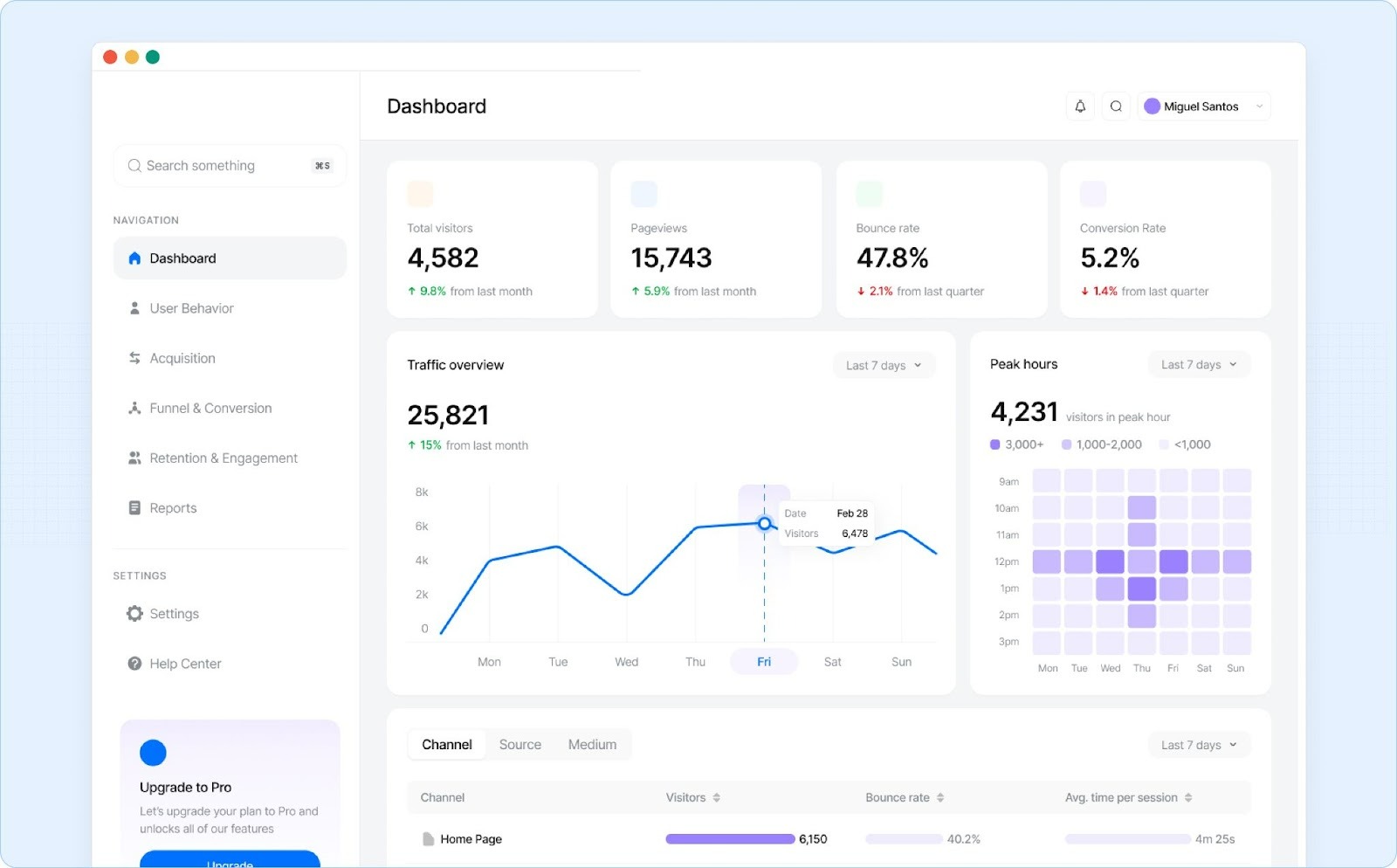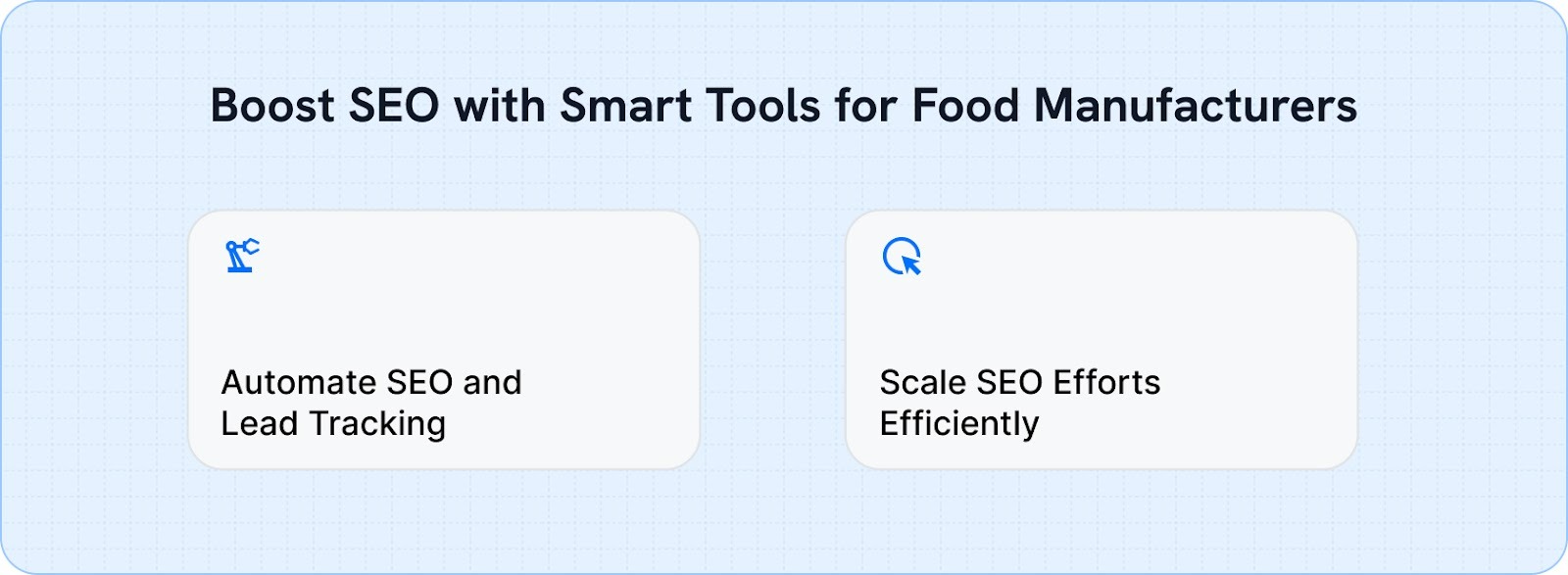Food manufacturers spend most of their time proving things. Proving safety. Proving consistency. Proving they can meet certifications, audits, and strict customer requirements. But there’s one place where that proof often falls short; online.
Buyers want to verify a supplier long before sending an RFQ. They want to confirm standards, understand ingredients, check capabilities, and see that you operate with the level of control their industry demands. When your website reflects that level of discipline and clarity, you feel like a safe choice.
That’s where SEO fits in. When your content matches the depth and detail buyers expect, RFQs start coming from companies that already understand what you can deliver.
In this blog, you’ll learn how food manufacturers can use SEO to support compliance, attract high-quality RFQs, and turn their operational strengths into a stronger digital presence.
What SEO Actually Means for Food Manufacturers?
SEO for food manufacturers is about presenting your operation in a way that helps buyers validate you quickly and confidently. Buyers look for the same core things: capability, reliability, and compliance. SEO is the system that organizes this information so it’s easy to find and easy to trust.
SEO is like a digital “facility tour.”
Strong SEO for food manufacturers focuses on:
- Clear capabilities: Ingredients handled, processes, volumes, packaging formats, and specialty capabilities.
- Compliance signals: SQF, BRC, HACCP, organic, gluten-free, allergen controls, facility certifications.
- Technical clarity: Spec sheets, process summaries, batch consistency, shelf-life info, and storage requirements.
- Buyer intent keywords: Terms tied to co-packing, private label, formulation support, and industry-specific needs.
When done right, SEO becomes part of your compliance story, structured information, presented clearly, backed by the standards you already follow on the production floor.
Why and How Food Manufacturing SEO Works Differently?
SEO for food manufacturers is a specialized strategy that goes beyond traditional search engine optimization. Unlike B2C businesses, your audience consists of B2B decision-makers such as procurement teams, food scientists, and QA specialists.
These professionals need precise, compliance-driven information that helps them make informed purchasing decisions. Here’s why your SEO strategy needs to be unique:
- Optimizing for B2B Search Intent: Your audience is focused on product specifications, certifications, and sourcing information. Tailor your content to meet these specific needs by highlighting:
- Quality control processes
- Supplier certifications
- Detailed product specifications
- Compliance-Driven SEO: Food manufacturers must navigate strict regulations. Integrate compliance requirements into your website content, such as:
- HACCP (Hazard Analysis Critical Control Point): A preventive system for managing food safety hazards at every stage of production.
- SQF (Safe Quality Food): A certification that ensures food manufacturers meet strict food safety and quality standards, recognized by global retailers.
- BRCGS (British Retail Consortium Global Standards): A globally recognized food safety and quality certification program for manufacturers.
- FSMA (Food Safety Modernization Act): U.S. FDA regulations focused on preventing foodborne illnesses by ensuring proactive safety measures in food production.
- GMP (Good Manufacturing Practices): FDA guidelines ensuring food products are produced and controlled according to safety and quality standards.
- FDA Food Labeling Regulations: Regulations that ensure food products are labeled with accurate ingredient, allergen, and nutrition information.
- Kosher and Halal Certifications: Voluntary certifications ensuring products meet Jewish and Islamic dietary laws.
- USDA Organic Certification: Certification ensuring food products are grown and processed without synthetic chemicals, fertilizers, or GMOs.
- FSSC 22000 (Food Safety System Certification): A globally recognized food safety management standard, accredited by the GFSI, for food manufacturers.
- ISO 22000: An international standard for food safety management systems, integrating HACCP principles for all stages of the food supply chain.
- Pallet and Packaging Safety Standards (ASTM and ISTA): Standards ensuring food packaging meets safety requirements for transportation and storage.
- Allergen-Free Certification: Certifications ensuring food products are free from specific allergens like peanuts, dairy, soy, etc., and are safely processed in allergen-controlled environments.
- Managing SEO Across Multiple Facilities and SKUs: With several facilities and product variants, your SEO strategy needs to account for:
- Regional SEO: Optimize for local search trends and product preferences across different locations.
- Product-Specific Keywords: Create separate pages or content sections for each SKU, ensuring that each product variant is easy to find and aligns with regional demand.
Turn Technical Details Into Search Visibility That Attracts Buyers

As a food manufacturer, getting your products noticed online isn’t just about showcasing your offerings; it’s about providing the right information in a way that speaks directly to your target audience. For procurement professionals, food scientists, and QA specialists, the information they need to make decisions often comes down to technical details, certifications, and reliability.
Here's how you can use spec sheets, certifications, and targeted keywords to make your website work harder for you.
- Targeting Product-Specific Keywords: When procurement teams are sourcing ingredients or packaging, they search for specific product details. Keywords like “almond protein isolate supplier” are crucial for reaching these professionals.
By optimizing your site for these product-specific searches, you make it easier for decision-makers to find you when they're looking for exactly what you offer.
- Create dedicated pages for each product with clear descriptions, technical details, and use cases.
- Focus on long-tail keywords that align with industry searches (e.g., “bulk almond protein supplier for food manufacturers”).
- Include product-specific information such as ingredient sourcing, production methods, and supply chain transparency.
- Why Certifications Matter for SEO & Compliance: For your audience, certifications aren’t just nice-to-haves; they're often a requirement for doing business.
Certifications like SQF, BRCGS, Kosher, and Halal help build trust and demonstrate your commitment to safety and quality. Here’s why they’re essential for your SEO and compliance:
- SQF (Safe Quality Food) and BRCGS (British Retail Consortium Global Standards) are widely recognized by procurement teams as indicators of rigorous quality control. These certifications make your products easier to find and more credible in search results.
- Kosher and Halal certifications are vital for reaching specific market segments. Food buyers looking for products to meet religious dietary requirements will often filter their searches based on these certifications. Optimizing your site with these credentials can help your business tap into these highly targeted markets.
- Incorporate certification logos and mentions in key places on your website (e.g., product pages, spec sheets, and the footer) to improve both user trust and SEO.
- Optimizing for Private-Label & Co-Packing Searches: If you offer private-label or co-packing services, you’re missing out on a huge opportunity if you're not optimizing for these searches.
Brands looking to outsource their production will search for manufacturers who can meet their specifications. By optimizing for terms like "private-label food manufacturing" or "co-packing services for snacks," you increase the likelihood of attracting new business.
- Create dedicated pages or sections that clearly explain your co-packing capabilities, minimum order quantities, and product customization options.
- Use targeted keywords like "custom co-packing for protein bars" or "private-label juice manufacturer" to attract brands that are looking for these services.
- Showcase your past work or successful partnerships with private-label brands to build credibility and trust.
How to Turn Your Food Manufacturing Site Into a Lead Engine
Your website can be more than just a digital brochure; it can be a powerful tool that brings in potential customers. For food manufacturers, this means making sure your website is easy to navigate, speaks directly to what your customers need, and helps them find the products they’re looking for.

Here’s how you can turn your website into a lead-generating machine:
- Build a Clear Website Structure Around Your Manufacturing Capabilities: Your website should be organized so that visitors can easily find what they’re looking for. If you specialize in processes like extrusion (shaping food products using heat and pressure) or fermentation (like in yogurt or beer production), make sure these capabilities are easy to find on your site.
When you clearly explain these processes, using keywords that potential customers might search for, it helps them find you and trust your expertise.
Example: Create pages explaining how your extrusion or fermentation process works, and include keywords like “extrusion process for food manufacturing” to help search engines find your pages.
- Create Industry-Specific Sections to Attract the Right Customers: You likely serve different industries, like Consumer Packaged Goods (CPG) or foodservice. By creating separate sections on your website for each industry, you can provide content that speaks directly to the unique needs of each group. For example:
- CPG Section: A page that shows how your products meet the needs of packaged food companies, with easy-to-understand case studies or product lists.
- Foodservice Section: A page that focuses on how your products can help restaurants or distributors, highlighting things like bulk packaging or compliance with food safety regulations.
- This structure makes it easier for visitors to find the information that’s most relevant to them, keeping them on your site longer and making it more likely they’ll reach out to you.
- Use Product Pages That Are Easy to Find and Understand: The pages on your website where you list your products should be clear, informative, and easy to navigate.
- Product Listing Pages (PLPs): These pages should organize your products into categories that make sense, like “protein-based snacks” or “gluten-free products.” Each product category should be easy to browse, with descriptions of what’s included in each category.
- Product Detail Pages (PDPs): These are where you provide the most detailed information about a specific product. Think of it as your “sales pitch.”
These pages should clearly explain the product’s benefits, specifications (like whether it’s allergen-free or certified Kosher), and show how it meets industry standards. Include buttons like “Contact for Bulk Pricing” or “Request a Sample” so customers can easily get in touch.
Templates to Simplify Your SEO Work
To turn your website into a lead-generating tool, focus on optimizing specific pages that resonate with your B2B audience. Here’s how to structure key pages to drive conversions:
- Detailed PDPs (Product Detail Pages): These pages should clearly present product information such as technical specifications, allergens, shelf life, and storage options. By providing detailed, relevant information, you help potential clients make informed decisions and improve your site’s relevance in search results.
- Capability and Co-Manufacturing Pages: If you offer co-manufacturing or specialized capabilities, create dedicated pages that explain your processes in detail. Use these pages to attract new partnerships by outlining what you can offer, such as custom production processes, quality control measures, and past successful projects.
- Geo-Targeted Plant Location Pages: If you have multiple manufacturing plants, create location-specific pages that target regional search terms. Highlight certifications, plant-specific capabilities, and compliance with local regulations to improve regional SEO and attract local business.
These targeted SEO templates help provide the right information, drive engagement, and ensure potential customers can easily find the specific details they need.
Optimize Your Compliance Content for Better SEO
In the food manufacturing industry, content isn’t just about showcasing products; it’s about ensuring compliance with a range of regulations while maintaining high performance in search engine rankings.
When it comes to SEO for regulated content, manufacturers face unique challenges. However, by focusing on key elements like product information, media files, and website performance, you can drive both compliance and SEO success.
Here's how you can optimize your website to meet both regulatory standards and search engine performance:
- Managing Downloadable Spec Sheets and COAs (Certificates of Analysis) for Better Indexing and SEO Value: As a food manufacturer, offering downloadable documents like spec sheets and COAs is essential for meeting industry regulations and building trust with your clients. However, these documents are also an important part of your SEO strategy.
- What You Need to Do: Make sure these documents are properly named, organized, and tagged with relevant keywords so search engines can easily index them. For example, instead of naming a spec sheet “document1.pdf,” rename it to something descriptive, like “almond-protein-isolate-spec-sheet.pdf.” This helps search engines understand the content and improves your chances of ranking higher for relevant keywords.
- Why It Matters: Having these documents accessible and properly optimized makes it easier for procurement teams and other B2B decision-makers to find the information they need. It also shows search engines that your site offers valuable, detailed content, which can help improve your rankings.
- Optimizing Media Files with Allergen-Friendly Alt-Text for Both SEO and Accessibility: Images and videos are a powerful way to showcase your products and manufacturing processes.
However, many manufacturers overlook the importance of optimizing media files for both SEO and accessibility. This is particularly important when your products may be subject to allergen regulations.
- What You Need to Do: For every image or video on your site, use alt-text that describes the content in a way that includes relevant keywords and complies with allergen labeling requirements.
For example, instead of using “product1.jpg” as the image name, you could use “gluten-free-cereal-allergen-free.jpg” and add alt-text like “gluten-free cereal with no nuts or dairy, safe for allergy sufferers.”
- Why It Matters: Alt-text not only helps improve SEO but also ensures your website is accessible to individuals using screen readers. For manufacturers, this is especially important as accessibility regulations grow stricter in various markets. Including allergen-friendly alt-text ensures you meet both SEO and legal requirements while enhancing user experience.
- Speed Optimization: Ensuring Fast Loading Times for Large-Scale Food Manufacturing Sites: Food manufacturing websites tend to be content-heavy, with detailed product descriptions, specifications, and large media files. Slow-loading pages can be frustrating for users and harmful to your search rankings.
- What You Need to Do: Invest in optimizing your website’s speed by compressing images, minifying code (like JavaScript and CSS), and using content delivery networks (CDNs) to serve files faster. For example, compress product images without sacrificing quality, and ensure that PDFs or spec sheets are optimized for quick downloads.
- Why It Matters: Website speed directly impacts both user experience and SEO. Google’s algorithms prioritize fast-loading websites, so improving speed can help you rank higher in search results. Additionally, faster websites lead to better engagement, reduced bounce rates, and higher conversion rates, critical factors for food manufacturers who want to attract more B2B leads and increase sales.
Your website needs to meet strict regulations while also showing up in search results.
How to Use Schema Markup for Real SEO Gains
Schema markup is a simple yet powerful way to make your website more visible in search results by providing search engines with structured data about your content. Here's how it can improve your SEO:
- Enhancing Product Details with Schema.org: Use schema.org markup to highlight key product information such as certifications, pricing, and product details directly in search results.
This can help your products stand out with additional info, such as “Kosher-certified” or “Price: $10,” making your listing more attractive and informative.
- Boosting Content Visibility with Structured Data: Implement structured data for things like breadcrumbs, FAQs, and videos. This helps search engines better understand your content and present it in richer formats, such as FAQ snippets or video carousels, which can drive more traffic to your site.
By using schema markup, you can make your content more informative and accessible to both search engines and users, improving your SEO and attracting more potential leads.
Build Authority With Useful, Honest Content
Building trust with potential clients is crucial for food manufacturers, and your website content plays a key role in this. Here’s how you can use content to establish your brand as a trusted expert:
- Authoritative Resources like Formulation Guides and Application Data: Offering in-depth resources, such as formulation guides or application data, can position your brand as an expert in the industry.
These resources help potential clients understand the technical aspects of your products and showcase your knowledge. By providing useful, detailed content, you make your website a go-to reference for decision-makers in the food manufacturing sector.
- Showcasing Your Commitment to Safety and Certifications: Certifications like HACCP (Hazard Analysis Critical Control Point) and FSSC 22000 are critical in the food industry as they ensure product safety and quality. Displaying these certifications prominently on your website reassures customers that your products meet industry standards. Highlight these credentials in product pages and key landing pages to build confidence and trust in your brand.
- Using Case Studies to Demonstrate Success: Case studies are a powerful tool to show real-world results. By sharing detailed stories of how your products have helped other businesses succeed, you build credibility and trust.
Case studies allow potential clients to see how your products perform in practical, real-world scenarios, making it easier for them to envision success with your brand.
By creating valuable content like guides, showcasing your certifications, and using real-world case studies, you position your company as an expert in the field, building trust and authority with your target audience. This not only helps improve SEO but also increases your chances of turning website visitors into long-term customers.
Power Up Your SEO With High-Value Backlinks
For food manufacturers, building a strong online presence is key to attracting more business, and one of the best ways to do this is by earning high-quality backlinks. Backlinks are links from other websites to yours, and they signal to search engines that your content is trustworthy and authoritative.
Here's how manufacturers can earn valuable backlinks to improve SEO:
- Leverage Partnerships with Trade Associations, Certification Bodies, and Universities: Collaborating with trusted industry bodies, like trade associations, certification organizations, and universities, can help you earn high-quality backlinks. When these reputable sites link to your content, it boosts your SEO by showing search engines that your website is a reliable source of information.
For example, being listed on a food safety certification body’s website or contributing to industry research published by a university can generate valuable backlinks.
- Collaborate with Distributors and Retail Brands: Building relationships with your distributors and retail partners can be another great way to earn backlinks. Share resources like case studies, joint research, or product features with your partners and ask them to link back to your website.
For instance, if a distributor uses your product in their catalog or a retailer features your product in their online store, they can link to your site, giving you a boost in search rankings.
By earning backlinks from respected sources like trade associations, certification bodies, and industry partners, you enhance your website's authority. This not only improves your search rankings but also increases the visibility of your food manufacturing business, helping you attract more leads and potential customers.
Track Metrics That Matter for Real Growth

For food manufacturers, tracking the right metrics is crucial to understanding how well your website is performing and where you can improve. Here’s how you can focus on the most important metrics to optimize your SEO strategy and drive real results:
- Focus on Conversion Metrics: While rankings are important, the real goal is to convert visitors into leads. Monitor metrics that show how well your website is turning visitors into potential customers. Key conversion metrics to track include:
- Sample Requests: Track how often visitors request product samples, as this is a strong indicator of interest.
- Qualified Leads: Focus on leads that are genuinely interested in your products, such as procurement professionals or food scientists, and monitor how many of them fill out contact forms or request quotes.
- Plant Tours: If your website encourages plant tours or site visits, track how often these are requested. Plant tours are a high-value conversion, signaling serious interest in your manufacturing capabilities.
- Use Event Tracking to Measure Content Performance: To understand which pieces of content are resonating with your audience, set up event tracking on your website. This allows you to monitor:
- PDF Downloads: Track how often visitors download spec sheets, COAs, or other product-related documents. This indicates how engaged visitors are with your content.
- Form Submissions: Measure how many users are filling out contact or inquiry forms. This tells you whether your content is driving visitors to take the next step toward becoming a lead.
- Optimize Your SEO Strategy Using Search Console Diagnostics: Google’s Search Console provides valuable insights into your website’s performance. Use the diagnostics and real-time data available in Search Console to:
- Identify SEO Issues: Find any crawl errors, broken links, or indexing issues that might be holding back your site’s performance.
- Monitor Keyword Performance: Track which keywords are driving traffic to your site and see if you need to adjust your strategy based on real-time data.
- Improve Content Strategy: Look at the performance of specific pages and content to see what’s working and what needs optimization.
By focusing on conversion metrics, tracking user interactions, and leveraging tools like Search Console, you can fine-tune your SEO strategy to drive meaningful leads, not just traffic. This approach helps ensure that your food manufacturing website not only attracts visitors but also converts them into valuable business opportunities.
Boost SEO with Smart Tools for Food Manufacturers

AI-powered platforms like Gushwork can transform your SEO strategy by automating tasks like keyword tracking, lead generation, and website optimization. These platforms help you streamline SEO, saving time and effort while improving your site’s performance.
- Automate SEO and Lead Tracking: Platforms like Gushwork optimize content, track keywords, and manage leads automatically, improving your site’s visibility and conversion rates.
- Scale SEO Efforts Efficiently: Automation saves time on repetitive tasks, allowing you to scale your SEO strategy without adding extra work. Focus on high-value activities like content refinement and new marketing initiatives.
By incorporating AI-powered tools, you can enhance your SEO, drive better results, and grow your food manufacturing business more efficiently.






















.webp)








.webp)
.svg)


.svg)
.svg)
.svg)




.svg)




.svg)